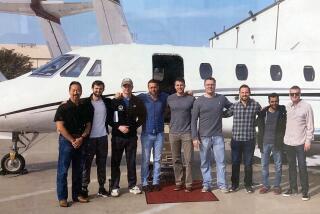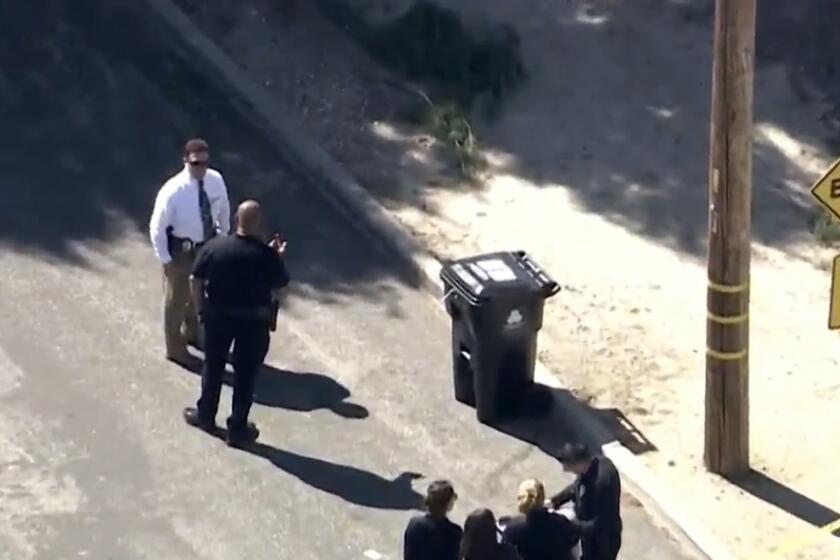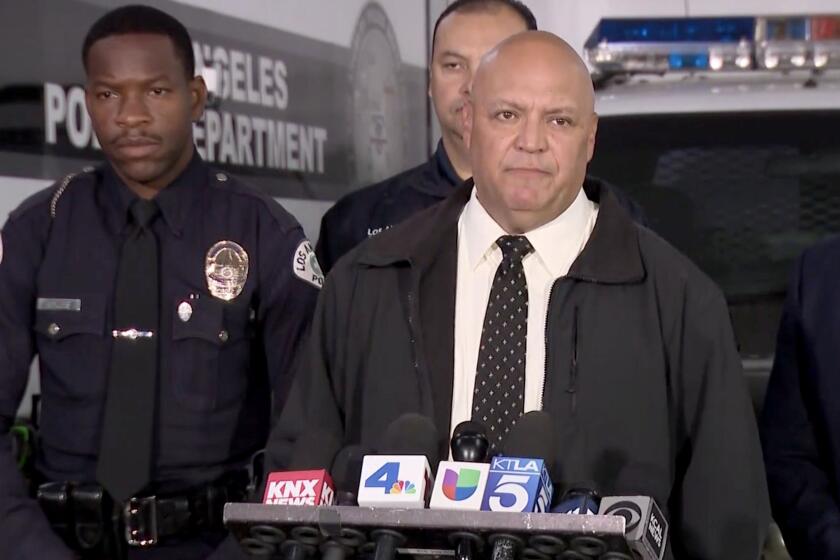Mr. Motivator : Hollenbeck Center’s Danny Hernandez Instills a Can-Do Spirit in Many East L.A. Youth
Children at the Hollenbeck Youth Center were skeptical when executive director Danny Hernandez promised them a party one Christmas.
They could not see how a Ping-Pong table he placed in the center of the gym could turn into Santa’s sled, or how Santa or his reindeer would be made to appear.
But they followed Hernandez’s advice and bought large pieces of cardboard, cut it to form the sides of a sled, nailed it to the Ping-Pong table and painted it red. They placed a stool in the center for Santa to sit on and borrowed motorcycles from a nearby police station to use as “reindeer.”
Eventually Santa appeared and hundreds of children sat in his lap and received a present.
“It was done from deep down inside the heart,” Hernandez recalls. “Because they wanted it to happen, they were able to make it happen.
“That’s what I do best. I’m like a kick start. I get them excited. Then I fall back and become a supervisor and let them use their own energy. Basically, I’m there to make them believe in themselves. That’s my whole purpose.”
Over the last decade Hernandez, 45, has instilled self-confidence in many of the young people of East Los Angeles. Since he became executive director of the Hollenbeck Center in 1980, the number of children and teen-agers using its gymnasium, boxing ring or weight room has jumped from about 1,000 to 6,000 a year. Meanwhile, Hernandez has expanded the annual budget 40 times from $25,000 to $1 million and is overseeing a $1.7-million, 1500-square-foot addition that will double the building’s space.
“He’s incredibly motivating,” says Cathy Gott, wife of Dodger pitcher Jim Gott, who has been on the center’s board of directors for four years. “As long as I have been around, everything conceived at the center has been conceived in Danny’s mind. He comes up with these ideas and everybody loves them and runs with them and they turn out to be successes.”
By most accounts, Hernandez develops those ideas during 10- to 11-hour workdays six days a week. He gets up at 5 a.m. and writes questions to his staff about everything from fund raising to the condition of the weight room to whether all employees are wearing their anti-drug T-shirts.
He usually arrives at work at 8. “I have staff meetings and expect people to report to me on these things,” he says.
Typically, he is on the run, and nothing seems too big or too small for his attention.
On one recent day, Hernandez held a morning budget meeting in a small room above the gym. Afterward, on his way to his office, he picked up a loose basketball before a child could fall over it, asked a staff member to fix a leaky air conditioner, told someone else what T-shirts to bring for a center rummage sale and talked with an employee about his upcoming return to school.
Then, Hernandez changed from his shorts, T-shirt and high-topped Nikes into a suit for a downtown fund-raising luncheon. He returned to the center and put on his shorts again, this time to sign letters, talk to a volunteer and play baseball and basketball.
“Sometimes you can’t give kids the advice you learn from education,” he says. “You have to give them a small piece of advice they can feel or something that excites them like shooting the basketball.
“Once you have them (involved), you can tell them stay off drugs, and they go for it. If you tell them before that, they say you’re preaching. If you work hard, you can make it to a point. But if (you work hard and) you’re educated, you can make it all the way. . . . I believe in the American dream.”
Hernandez developed his faith in the American dream in an apartment three blocks from the center. He grew up with his mother and a younger brother and sister; his father left when he was 4 and sees Hernandez occasionally.
When Hernandez was 11, he learned that he could always do more than he thought he could. He had to push the wheelchair of an uncle who had muscular dystrophy downtown every day for eight summers so the man could sell pencils.
“He made me go physically beyond any point I’d ever gone,” Hernandez says. “Sometimes we used to fall. Because he was too heavy for me, I used to find ways to put him back into his chair. . . .
“And those are the things that stayed with me. Things could be the worst that they could be, but you’ve always got one or two extra steps that you can take.”
Hernandez graduated from Roosevelt High School in 1965 and California State University Los Angeles in 1976. He was working in a federal program helping minorities find jobs when he was hired as executive director at the center, which was started in 1972 by merchants and the police after a series of riots in East L.A.
“No one has ever put a stop sign on me,” he says. “They might put obstacles in front of me, but I would either go around them, under them, over them or sometimes even go through them if I had to.”
For many years, Hernandez worked 15 hours a day, seven days a week, spreading that message. He recently cut back slightly to spend more time with his daughter Priscilla, 13, and wife, Beatrice.
“I tell the kids (from Hollenbeck) don’t ever tell me you can’t do something. You may not be able to do it right now, but you will. We’ve seen kids go to college. We’ve seen kids go to the Olympics. You dive in. Once they do, kids say ‘Danny, Danny, it’s great!’ ”
More to Read
Start your day right
Sign up for Essential California for news, features and recommendations from the L.A. Times and beyond in your inbox six days a week.
You may occasionally receive promotional content from the Los Angeles Times.






